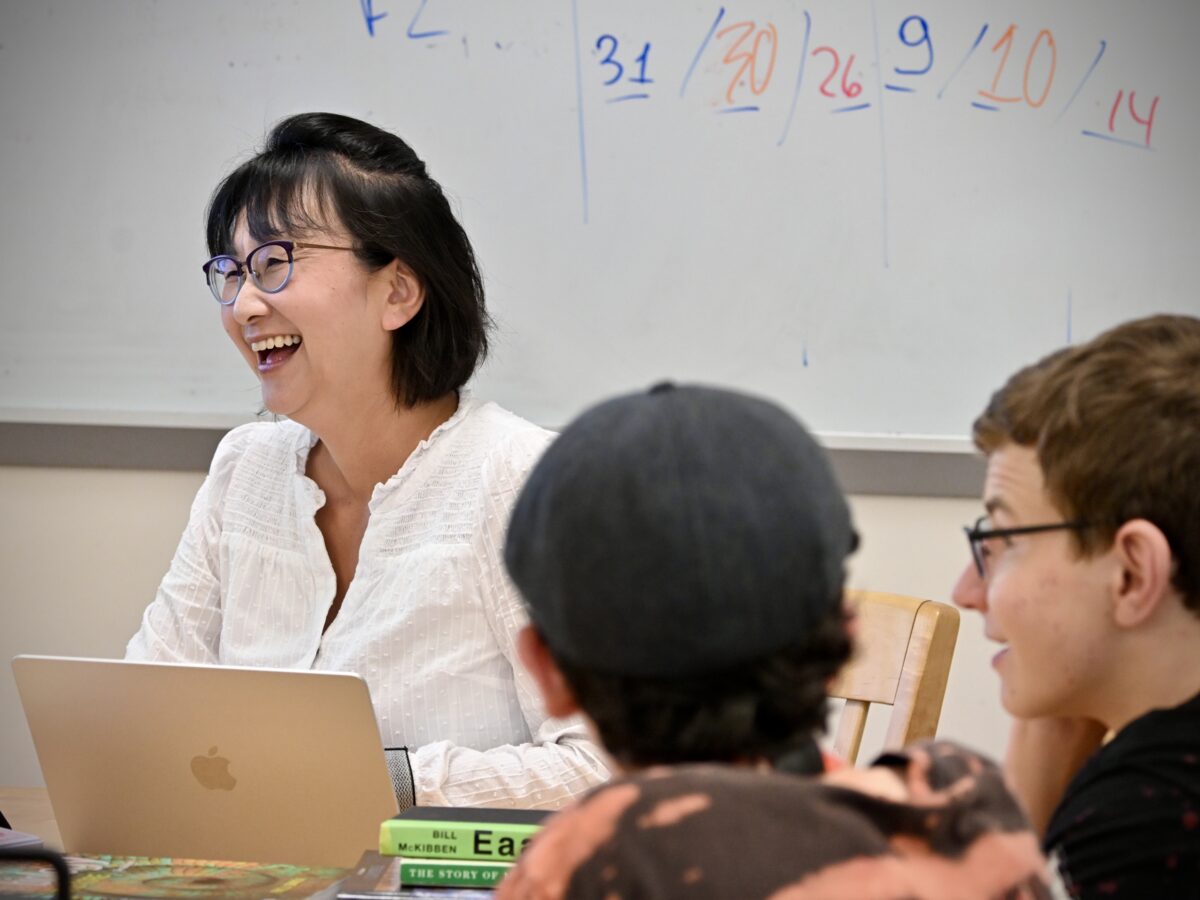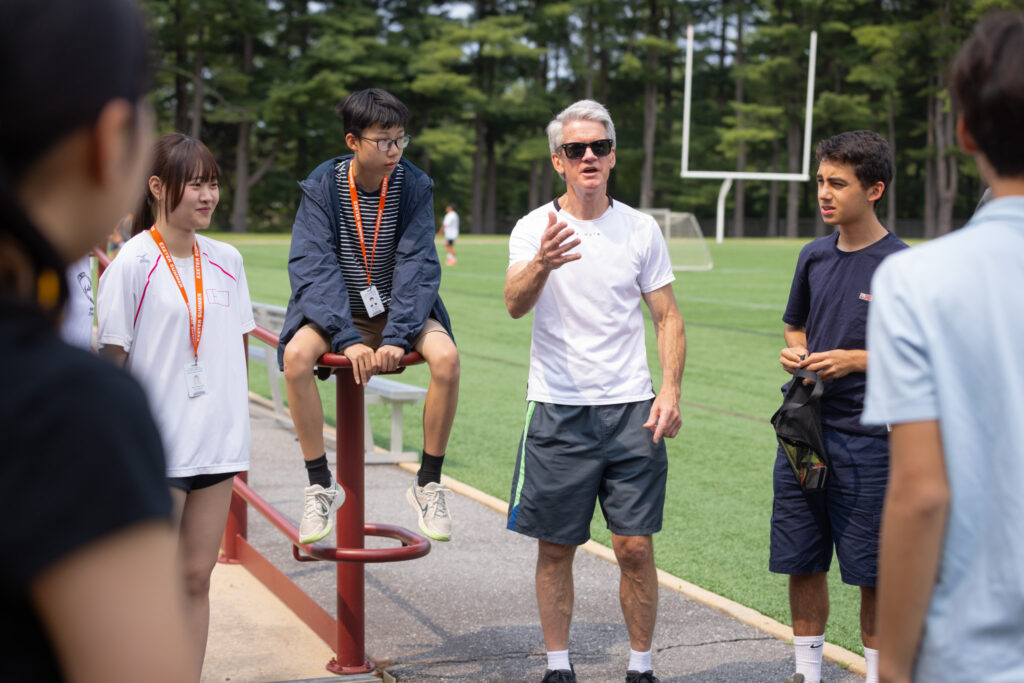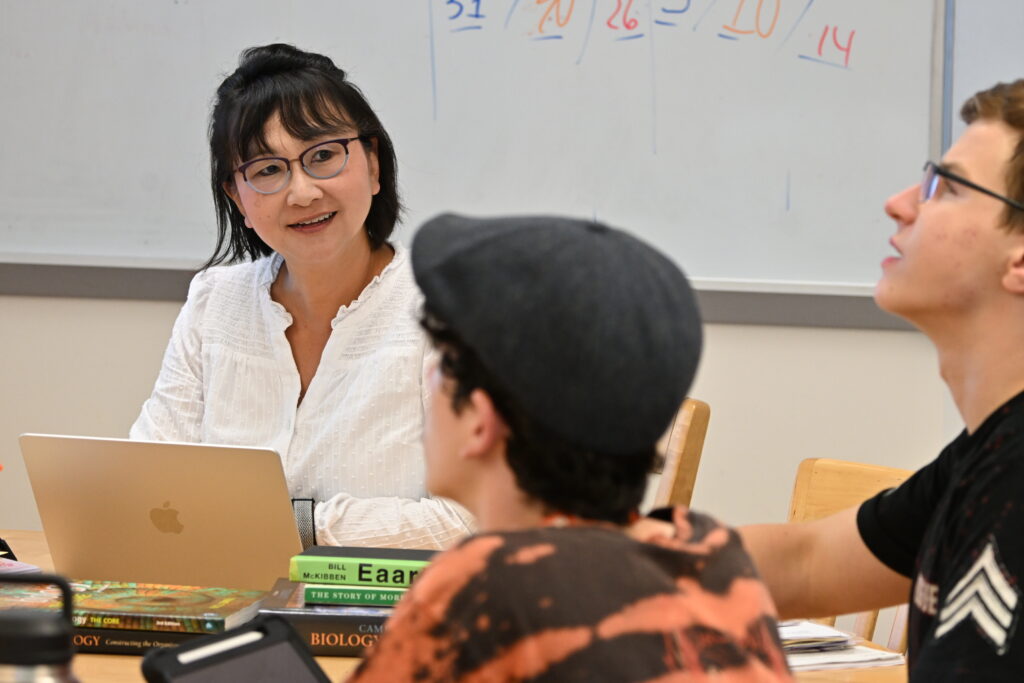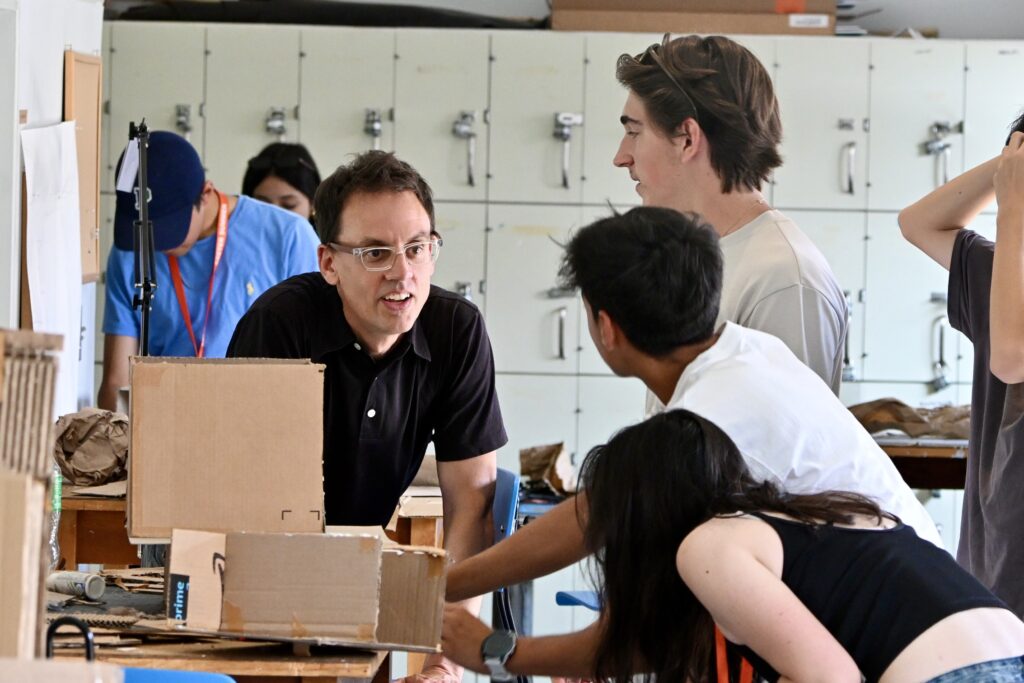Summer, when the stars come out

Exeter Summer program boasts faculty filled with passion and real-world experience.
Every summer, Exeter’s classrooms are guided by a roster without rival: veteran educators who can’t resist a return year after year, Academy instructors who bring the Harkness spirit into July, and professionals from beyond campus who step out of their real worlds to step into ours.
Together, they contribute to the dynamic mix that makes Exeter Summer unforgettable. We spoke with three Exeter Summer instructors: a familiar face who’s been returning for decades, an Academy faculty member who brings her regular-session expertise into summer, and a professional who presses pause on his career to join the classroom. Their stories show just how many paths can lead to Exeter — and how each teacher adds something special to the program.
Dennis Murphy: Long may you run
The French Alps and the New Hampshire seacoast share little in common; perhaps only Dennis Murphy, a native to neither region who nonetheless calls each home. A full-time resident of Chamonix, Murphy has spent his last 46 summers living and teaching in Exeter, as reliable a campus sight in July as the belltower.
Murphy was born and raised on Massachusetts’ North Shore and matriculated at Andover, then Dartmouth, honing his hockey prowess at both schools while earning a history degree. Invited to attend rookie camp with the NHL’s Chicago Blackhawks, Murphy instead went abroad. He signed an eight-month contract to play professional hockey in Denmark in 1980.

So began an annual migration that has spanned decades. Each winter, Murphy would play hockey in Europe — after Denmark came France. Each summer, he would return to New England — more specifically Exeter — where he originally signed on to work a hockey camp run by longtime Exeter coach Bill Dennehy.
“He said, ‘OK, how many?’ Because it was a two-week session, times four, so it was eight weeks,” recalls Murphy. “And I said, ‘How many what?’ And he said, ‘How many weeks.’ So, I said, ‘Well, I’d like to do all eight if that’s possible.’”
For a young hockey player subsisting on a series of eight-month contracts, it was a sweet gig.
“I came in for the summer, we would coach, then we’d play tennis. We had free golf at the Portsmouth Country Club. That was part of the deal.
“And we got to skate. We had the key to the rink. So, we’d put the [campers] to bed, and then we’d go back to the rink and skate at night.”
Murphy’s intercontinental existence evolved on both sides of the Atlantic. Coaching followed his playing days, all in his adopted France, where he earned master’s degrees in French and English. He taught English at the University of Grenoble from 2008 until his recent retirement.
His role at Exeter evolved, as well. The sports programs were absorbed into Exeter Summer programming, and Murphy came along, too. He has taught languages, history and physical education during the five-week session through the years. He recently wrapped up a summer session coaching cross-country running and Ultimate and serving as a dorm head.
“The kids are excellent,” he says. “It’s five weeks. It’s a concentrated experience. They come in; there’s fear. They’re shy. Then you can see everything just becomes a melting pot. As they get on, they don’t want to leave. Even the boys will start crying at the end of the last week and they’ll hug. It’s incredible how close they become.”
Murphy turns 69 in June, but his summer sojourns will continue. He learned recently that Ralph Blumenthal taught journalism in the Exeter Summer program into his 80s.
“He worked until he was 82,” Murphy says. “I want to beat him by a year.”

Susan Park: At home in the classroom
Susan Park teaches four classes of chemistry, five days a week through three terms of Exeter’s regular session. You can see how she’d want to reset over summer break.
So, she teaches biology.
“I’ve been doing summer gardening and there’s really only so long you can be pulling weeds in the sun,” Park jokes.
It’s more than air conditioning that keeps Park in the classroom. She arrived at Exeter in 2021 after a 10-year hitch at Hotchkiss School, where she regularly pulled summer duty. She also has taught high school summer programs at Harvard, Cal-Berkeley and Northwestern.
“I think it’s a great opportunity, especially for students who want to invest themselves in things that just come naturally to them,” she says. Park also appreciates the freedom of the Exeter Summer curriculum that allows students to explore topics that interest them without the pressure of trying to achieve a grade. “It allows students to test their ideas and not hesitate.”
She’s in good company among her colleagues: Of Exeter Summer’s 120 teachers, roughly half are regular-session teachers.
“What I find that is neat about summer programs is that you learn how different school systems, even different countries, approach learning. And you see that there’s a lot of overlap.”
Park has spent a lifetime learning. She has a bachelor’s in science from MIT and a doctorate in philosophy from Northwestern. Whether its chemistry in the regular session or biology in the summer, she finds the students share a deep interest in discovery.
“The kids are still very inquisitive,” she says of the Exeter Summer enrollees in comparison to the regular-session students. “They want to figure out how things work. I think it’s very similar in that we’re developing their talents, getting them interested, developing their passions. It’s all there.”

Brian Murphy: Tapping into the creative side
The narrow design space on the top floor of Mayer Art Building can feel close on hot days, but the Upper School students in Brian Murphy’s Architectural Design Process class don’t seem to notice or mind. They are immersed in a project to design their own studios, and Murphy bounces from one table to the next to inspect their progress.
He’s moonlighting. His day job is with Placework, a Portsmouth design firm he and his wife founded in 2010. He began teaching at Exeter Summer in 2023.
“I have a really great team and a really great partner, and it allows me some flexibility,” Murphy says after his students wrap up for the day. “I’m on my way back to Portsmouth now to catch up with my other job.
“That’s something I happen to share with students here: that the work is never done. If you’re tapping into your creative self, you’re always thinking there’s always more to do.”
Murphy recalls one of his own instructors in high school asking him to consider teaching as a career, a suggestion that seemed dubious to him at the time. But today he teaches an introductory architecture course at the University of New Hampshire along with his five-week stint at Exeter Summer. He also has worked with area middle and high school students on projects centered around climate education.
Murphy says he gets as much as he gives in the classroom. “That’s part of the reason why I’m doing this. I can help kids by sharing my experience and the things that I’ve learned, but I’m here to learn more. I’m here to learn how people work together. I’m here to learn what is important to people in their sense of place. I work with adults all the time in contracted projects, and I feel there’s a lot to learn there. But here in this environment, there’s so much to learn from the adolescent mind and where they are in development and the way that they can tap or maybe inadvertently share what they’re feeling or what their way of knowing is.”
He has found Exeter Summer students as typical teens in many ways but with a spark to be kindled.
“I’ve worked with a lot of different kids, and these are definitely normal kids, but there’s something else,” he says. “I think that the thing that compels them to come to a program like this speaks to some other dimension that any human being has. … Being creative and being passionate and being compelled to do the work, I think that that rests within most human beings if you tap it the right way.”